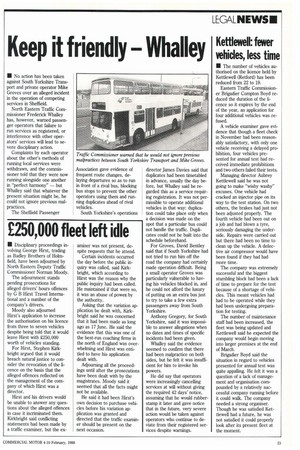Keep it friendly Whalley
Page 25

If you've noticed an error in this article please click here to report it so we can fix it.
• No action has been taken against South Yorkshire Transport and private operator Mike Groves over an alleged incident in the operation of competing services in Sheffield.
North Eastern Traffic Commissioner Frederick Whalley has, however, warned passenger operators that failure to run services as registered, or interference with other operators' services will lead to severe disciplinary action.
Complaints by each operator about the other's methods of running local services were withdrawn, and the commissioner told that they were now running alongside one another in "perfect harmony" — but Whalley said that whatever the present situation might be, he could not ignore previous malpractices.
The Sheffield Passenger Association gave evidence of frequent route changes, delaying departures so as to run in front of a rival bus, blocking bus stops to prevent the other operators using them and running duplicates ahead of rival vehicles.
South Yorkshire's operations director James Davies said that duplicates had been timetabled in advance, usually the day before, but Whalley said he regarded this as a service requiring registration. It was not permissible to operate additional vehicles in that way: duplication could take place only when a decision was made on the spot that a particular bus could not handle the traffic. Duplicates could not be built into the schedule beforehand.
For Groves, David Bentley said that if South Yorkshire had not tried to run him off the road the company had certainly made operation difficult. Being a small operator Groves was particularly vulnerable to having his vehicles blocked in, and he could not afford the luxury of putting on an extra bus just to try to take a few extra passengers away from South Yorkshire.
Anthony Gregory, for South Yorkshire, said it was impossible to answer allegations when no dates and times of specific incidents had been given.
Whalley said the evidence seemed to confirm that there had been malpractice on both sides, but he felt it was insufficient for him to invoke his powers.
He did say that operators were increasingly cancelling services at will without giving the required 42 days' notice, assuming that he would rubberstamp it later and gave notice that in the future, very severe action would be taken against operators who continue to deviate from their registered services despite warnings.




















































































